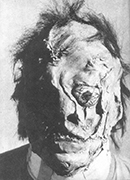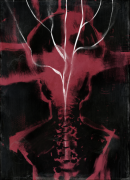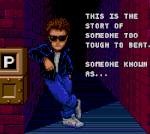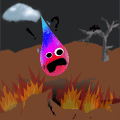|
I've signed myself up to teach a lit class on "Difficult Literature" and it's had me pondering that term. Difficulty changes a lot over time, and ends up meaning many different things to many different groups of readers. Sometimes it's an aspiration that the literati are aiming for, like in the age of "high" modernism, when Joyce and Eliot and Woolf and Pound and so forth are all testing the boundaries of the language. Sometimes it's said in dismissal, as when critics or other writers are dismissing stuff as pretentious, or wanky, or somehow difficult only for its own sake. (And of course, usually these two meanings are never found far from each other.) Sometimes it means difficult as in hard to read emotionally, like with Thomas Hardy or Toni Morrison. Sometimes it's hard to read for content, like with William S. Burroughs or Kathy Acker. It can be hard to read mechanically, like Danielewski or concrete poetry. It can be difficult because it demands so much attention from the reader, like Nabokov or Gene Wolfe. Most often, it's a mix of most of the above. Given the title of the class, the students—most of whom will be high-level undergrad English majors—know what they're getting themselves into, so I can assign pretty much anything. I want it to be stuff that is generally accessible and won't break the bank; since I was hired on to teach 20th/21st-century Anglophone lit, it'll be mostly 20th/21st-century Anglophone stuff. Also, I want to cover a lot of smaller things rather than a few big things (so maybe one or two big novels, but no Ulysses or Gravity's Rainbow or Dhalgren or Infinite Jest, etc. except maybe in excerpts). But beyond that, carte blanche—and while my examples here are mostly fiction, it'll also have poetry and drama as well. What would you assign? If you signed up for that class, what would you expect or hope to read? And beyond that, and more importantly, what does "difficult" mean to you when applied to novels, poems, plays, etc., and how do you respond to it?
|
|
|
|

|
| # ? Apr 19, 2024 20:45 |
|
For me a work is difficult when it challenges you to change your comfortable mode of thinking or to view it from a perspective you would not naturally assume. Difficulty shouldn't mean frustration or impenetrability. A difficult text should throw down a gauntlet to the reader, who, through curiosity or bloody mindedness, feels compelled to snatch it up. Apologies I can't offer a modern example as my reading is mostly pre 17th century, but a writer who springs to mind is the poet Robert Henryson. He wrote a series of moral fables that read like very simple and short childlike stories. He starts with a short prologue saying 'this tale is going to be about a hen who is blessed with fertile eggs' and then he tells the main story in which a hen is faithful, works hard and is rewarded with healthy chicks. The moral of the story is obvious and you feel very comfortable. Then the tale ends with the 'morilitas' in which Henryson tells the reader 'this simple tale teaches us, dear reader, that pride is a vile sin and corrupts even the sweetest minds.'. At once the reader is thrown off by the sudden strangeness of the morilitas and everything they thought they knew about their comfortable understanding is challenged. They are compelled to go back and read the tale again with fresh eyes, with a new mode of thinking. That to me is a difficult text, it hands you the moral of the story with one hand whist tearing away your own moral with the other. I love that feeling of strangeness and uncertainty.
|
|
|
|
Based on everything you described above could the modes/uses/etc of difficulty be the focus? The idea being that something that is difficult obviously requires labor to get through but to also create. So the inquiry searches for the function/craft/affect of the difficulty. Or maybe that's already what you mean by having a difficult literature course. The story I would love to see your class discuss is "Hands" by Sherwood Anderson
|
|
|
|
I would add in books that are enormously long as a form of difficulty, but I guess that doesn't quite fit into your plans for the class.
|
|
|
|
Beowulf or Sir Gawain in the original Old/Middle English. Excerpts, at least, if not the entire works. Examine the idea of difficult language on a whole 'nother level.
|
|
|
|
|
Faulkner's Go Down, Moses is short and dense as hell, and full of short stories and novellas you can pick out if you want something shorter. Then compare/contrast with something nice and terse by Steinbeck or Hemingway. The best single short story for Nabokov is probably Signs and Symbols but Lolita would be a good course-closer on all fronts. Hieronymous Alloy fucked around with this message at 03:48 on May 5, 2015 |
|
|
|
|
End Of Worlds posted:Beowulf or Sir Gawain in the original Old/Middle English. Excerpts, at least, if not the entire works. Examine the idea of difficult language on a whole 'nother level. On a similar tack, Robert Henryson's fables in Middle Scots. They're excellent renditions of Aesop's fables, and Middle Scots is easy enough to pick up if you understand English. Might be an interesting way to see how the language developed?
|
|
|
|
Perhaps some Beckett? I'm particularly thinking of the Molloy trilogy although his plays would do well for the drama segment. In general, he gets a lot at language itself and how it shapes our perception. The Unnamable in a way is a being of pure language.
|
|
|
|
Alternate plan: whole syllabus, just Finnegan's Wake, over and over again
|
|
|
|
|
I don't think mechanical difficulty of reading for it's own sake is something that should really be considered an asset of a book. You've said this is a high-level class and the kids know what they're signing up for, so a book being dense isn't necessarily a problem either, but if I was taking this class I definitely wouldn't be excited if 'difficult' just meant you wanted me to wade halfway through Moby Dick by next Wednesday or something.
|
|
|
|
I don't know that it qualifies as literature - Riddley Walker, by Russell Hoban. On the first read the process of determining meaning from the obvious bits of context and slowly gaining a full understanding of the mutated phrases and language made it rewarding and difficult in a way that old English works both are and aren't. I understand there now is an edition with a glossary, which I think would totally ruin it. I'm looking forward to the reading list to come out of this thread; it sounds like an interesting course!
|
|
|
|
End Of Worlds posted:Beowulf or Sir Gawain in the original Old/Middle English. Excerpts, at least, if not the entire works. Examine the idea of difficult language on a whole 'nother level. Blind Sally posted:On a similar tack, Robert Henryson's fables in Middle Scots. They're excellent renditions of Aesop's fables, and Middle Scots is easy enough to pick up if you understand English. Might be an interesting way to see how the language developed? I don't really think that "it's difficult to read a book in another language that you don't know well" should really apply to a course like this. I would have difficulty reading genre trash in Old English but that doesn't mean the book itself is particularly difficult, it just means that I don't know Old English. If "knowledge of the language" is the only thing making the book difficult, I don't really think it's fair to call the book itself difficult, because somebody who does know the language would not find it to be a difficult read. Language is, imo, a source of artificial difficulty; you either know the language well enough to read the book and so the language doesn't add notable difficulty, or you do not and it does.
|
|
|
|
Beowful, Sir Gawain, and Henryson's Moral Fables aren't just "difficult" because of their language though? They're all brilliant texts with a lot of depth that are worth reading. If that's the only complaint, then grab the any of the many, widely available English translations. Middle Scots is incredibly easy to decipher if you know English, though. Once you're familiar with a few conventions, it's remarkably similar to Modern English barring the spellings. I stand by the recommendation for the Moral Fables in English or Middle Scots (either is available for free online). Henryson had a brilliant mind, judging by his writing, and the fables offer a complex worldview, complete with sombre lessons while still providing humour (they're adaptations of Aesop's fables, after all, complete with talking animals), all linked under the idea of the church as the ruling power. The lifestyles and worldviews of people in the 1400s are different than what they are now. The difficulty would be in understanding centuries old morality and reconciling it with modern views. That, and the book is also a brilliant piece of poetic prose worthy of a look. That's why I recommend it.
|
|
|
|
Any English Lit major will have read Beowulf and Sir Gawain and the like in their intro courses. Those are like fundamentals of English literature that hopefully everyone in the class will already be familiar with. Don't waste their time making them reread it. I guess the question is, how much do you want this course to focus on modernism and postmodernism?
|
|
|
|
Thanks everyone for suggestions! Hope to hear lots more—Mange Mite posted:I would add in books that are enormously long as a form of difficulty, but I guess that doesn't quite fit into your plans for the class. Right, I could maybe do one big huge long novel, but more than one and it becomes a big huge long novel course. Which is also great, and I'd be excited to teach it—something like Tom Jones / Middlemarch / Ulysses— but here it wouldn't leave time for much else. End Of Worlds posted:Beowulf or Sir Gawain in the original Old/Middle English. Excerpts, at least, if not the entire works. Examine the idea of difficult language on a whole 'nother level. Great idea, and I may mix something in—although possibly on the other end of things, using Russell Hoban's Riddley Walker to show one potential future for English, which also would also allow us to loop back into its past. Hieronymous Alloy posted:Faulkner's Go Down, Moses is short and dense as hell, and full of short stories and novellas you can pick out if you want something shorter. Then compare/contrast with something nice and terse by Steinbeck or Hemingway. "Signs and Symbols" is a good call, I've used it before in arcs of narrative disability—stories that put you in the same frame of mind as an intellectually disabled (or neurodiverse, if you prefer) character within the story. The Curious Incident of the Dog in the Night-time is the obvious example, though I think Philip K Dick's Martian Time-Slip is way more effectively deranging, as well as three or four different Richard Powers novels. I might, though, use Crying of Lot 49 to get them all good and apophenic. "Vane Sisters" is another Nabokov on the possible list. I've got the first half of The Sound and the Fury pencilled in for my Faulkner, but that's still so much. Could switch it to As I Lay Dying. Hemingway's a tricky one, but there's plenty of stories from In Our Time that would work, like "Big Two-Hearted River"; I find later Men Without Women era ones not nearly so subtle. TrixRabbi posted:Perhaps some Beckett? I'm particularly thinking of the Molloy trilogy although his plays would do well for the drama segment. In general, he gets a lot at language itself and how it shapes our perception. The Unnamable in a way is a being of pure language. Oh, definitely some Beckett. May go for the plays though, since I need a handful of those. Endgame maybe, if I want the full-on treatment, or Happy Days if I can bury a student neck-deep in sand. Hieronymous Alloy posted:Alternate plan: whole syllabus, just Finnegan's Wake, over and over again This sounds like my life, more or less. Will for sure do some very small readings from the Wake. I've had a lot of success in the past just turning a class loose on a single page or even paragraph, and seeing how much they can dig out of it.
|
|
|
|
I remember reading this essay in Harper's in 2005: http://www.williamgaddis.org/marcus.pdf But I can't claim to have read any of the authors mentioned by the writer, who also has written his own high lit. Personally, rather than reading modern literature that was purposefully written to be difficult, I think it would be a good use of class time to read ancient literature that is considered difficult nowadays simply because it was written for people with longer attention spans. For example, the Iliad and the Odyssey ask timeless questions but they require a good amount of thought and discussion to coax out. I also recommend the Tale of Genji, but that's me being an Asian philosophy snob. You'd have to coax the class into reading the whole thing and really thinking hard about it, so that's a certain level of difficulty right there. edit: Brothers Karamazov would be another book that is intimidating in its size, but can become quite fruitful in discussion. Also, Les Miserables. Nagato fucked around with this message at 00:58 on May 6, 2015 |
|
|
|
TrixRabbi posted:Any English Lit major will have read Beowulf and Sir Gawain and the like in their intro courses. Those are like fundamentals of English literature that hopefully everyone in the class will already be familiar with. Don't waste their time making them reread it. Rereading has its own challenges and difficulties, of course, but yeah I'm not too keen on putting them back through medieval texts they've already had with people who know way, way more about them than I do. Pretty inevitable that modernism will be a major fixation of the class, but I don't just want to recapitulate TS Eliot's high-modernist narrative of lit history. "Modernism" has gotten to be a really slippery word, and it's clear by now that all those changes were underway well before Ulysses or The Waste Land came out, so really it's all modernism Nagato posted:Personally, rather than reading modern literature that was purposefully written to be difficult, I think it would be a good use of class time to read ancient literature that is considered difficult nowadays simply because it was written for people with longer attention spans. For example, the Iliad and the Odyssey ask timeless questions but they require a good amount of thought and discussion to coax out. I agree that it would be wonderful to read a lot of these longer works that there generally isn't time for in a classroom setting, but I do have to generally stick with English language lit, since the class is offered within an English dept and it'll be mostly upper-level majors. Also, since the course title is "Difficult Literature," I think I have to assign at least some literature that was written with difficulty in mind, so that we can talk about why that particular type of difficulty might have seemed so important to those writers, or to the critics and readers at that time and after. Also, you have the "attention span" thing almost precisely backwards—oral storytelling, which the Iliad and Odyssey come out of, required simpler overall plots (like retelling stories everyone was already familiar with) and less character depth because you can't expect an audience to keep everything straight when they have to keep all the info in their heads. Technological changes like writing and printing, and sociological changes like leisure time, all make it possible for literary works to become more complex. (Note that this does not necessarily mean "better.") Ben Marcus is a fantastically weird writer, though, and I'll probably tack some or all of The Flame Alphabet to the end of the course. elentar fucked around with this message at 02:25 on May 6, 2015 |
|
|
|
Difficult for me would be anything that has layers which force you to think and reflect in order to decipher meanings. The first thing that comes to mind would be The Recognitions by William Gaddis. There's a lot going on with a lot of references and allusions. It can be difficult to keep track of.
|
|
|
|
I think Faulkner would be a good author. I never read Go Down, Moses but was thinking Absalom, Absalom! Probably one of the more difficult of his I've read in terms of denseness and form.
|
|
|
|
I don't know if you are looking for short stories, but they might be a good way to bridge the gap between difficult and long. Maybe try some postmodern short stories like Coover's "The Babysitter," Barthelme's "The Balloon," or Barth's "Lost in the Funhouse." If you do "Lost in the Funhouse," you should consider reading David Foster Wallace's "Westward the Course of Empire Takes its Way," which is a response to "Lost in the Funhouse."
|
|
|
|
Do your own homework.
|
|
|
|
Maldoror by Comte de Lautréamont.
|
|
|
|
The Illuminatus! Trilogy by Shea and RA Wilson.
|
|
|
|
I have a sincere question for this thread: how do you tell the difference between genre trash and real literature? Why is Patrick O'Brian on the garbage heap and William Faulkner in the reliquary? Where does Jane Austen belong?
|
|
|
|
Arglebargle III posted:I have a sincere question for this thread: how do you tell the difference between genre trash and real literature? The books people call "genre trash" typically do not explore or even attempt to explore any substantial themes beyond the superficial ones that prop up the story. This is why Neuromancer is literature and A Game of Thrones is genre trash.
|
|
|
|
Actually, Neuromancer is trash too.
|
|
|
|
precision posted:The books people call "genre trash" typically do not explore or even attempt to explore any substantial themes beyond the superficial ones that prop up the story. This is a really unproductive way of looking at literature though—for one thing, it assumes that we have a really firm grip on what "substantial themes" are important, and that's just not borne out historically. A lot of stuff that people thought was just total schlock turns out to be really important in helping us understand blind spots in that place and time. I mean, porn and erotica is just one major area that can tell you loads about a culture, but it applies to a lot of other forms and authors as well. Am I saying that GoT is going to be some great epic milestone to the readers of the future? Of course not. But it could easily still be read and analyzed as reflecting important things about the US and world over the past 20 years, even if it's not "exploring substantial themes." And it's definitely interesting that it's the example people go to in order to define "genre trash." . Meanwhile, a bunch of stuff that people have rated really highly as literature (and not just on the basis of sales, either) can fall off the face of the earth, if later generations of readers come to the conclusion that those books or authors don't have as much to say anymore. And then, sometimes people will come back around to those authors again, and they'll have a revival. These fluctuations in literary fortune say as much or more about the people reading the books as it does about the books themselves, and there's defintely not any stable point you can stand on and separate things out into "literature" and "trash" for all time. Even further, a lot of the books we regard as canonical literature now wouldn't have happened if the people who wrote them hadn't been passionate readers of more disposable literature. Cervantes read all those courtly romances that Don Quixote acts out. Jane Austen (who is about as canonical as you can get) loved and hated Gothic novels in equal measure. Joyce and Pynchon and Borges and a lot of other great authors read and found worthwhile stuff in absolutely everything, etc. Dragging it back to the actual thread: pulp fiction, trashy fiction can actually be really difficult for people to come to grips with, precisely because it's so easy to dismiss, and so hard to actually read with eyes open. Like what you like, and call out what you don't—but call out specific things, and keep in mind that every book has something to teach, however unintentionally.
|
|
|
|
I don't actually disagree with any of that. On a personal level I don't really bother with separating books into "lit" and "not lit" piles, I just separate them as "good" and "not good". For example I have no idea if Irvine Welsh or Neal Stephenson will be viewed as literature or genre trash in 50 years. Most of my favorite writers could go either way. Another example would be someone like Tom Robbins, or Michael Swanwick. I was more trying to explain what compels other people to call something "genre trash".
|
|
|
|
I know it's uncouth to bring it up, but is it just possible that, in the world of writing and publishing, ego might have something to do with it?
|
|
|
|
I think an excerpt from JR by Gaddis would be a nice way to bring people to bear on Postmodernism. Maybe just showing off a few pages and how he slips between characters and settings. I was not able to finish it, but it's style is a fantastic thing to experience, however difficult to endure.
|
|
|
|
I think a lot of good options have been covered, but just to throw out a suggestion that springs to mind and hasn't been mentioned: The Crossing could perhaps present difficulty on a few different metrics. For one, McCarthy's typical writing style (quote-less dialog, dense prose, complex sentences) is certainly an above-average challenge to the reader to pay attention to the text, Bhaal fucked around with this message at 01:07 on May 16, 2015 |
|
|
|
Gertrude Stein! I would still go The Sound and the Fury over As I Lay Dying. My Faulkner class generated a more interesting and enthusiastic conversation about the former over the latter (which many of us had already read). Also, I wouldn't shy away from assigning the whole book- the syllabus contained six books and a handful of short stories for a semester (across both Conrad and Faulkner) and this was a 300 level undergrad course. Edward Albee would be a fun playwright to cover under the "emotional difficulty" level. His plays are accessible but very, very vicious and can be uncomfortable to experience. Also, imagine having a class about the extended metaphor of goat loving.
|
|
|
|
elentar posted:What would you assign? If you signed up for that class, what would you expect or hope to read? And beyond that, and more importantly, what does "difficult" mean to you when applied to novels, poems, plays, etc., and how do you respond to it? I have no idea what I would assign for your class, but to respond to the rest of your questions I would hope to read books that are not often encountered by Western audiences. This may mean they are books in translation or books that present ideas and themes that are written for non-Western audiences. It would be interesting to read these kinds of books and pick apart the question of "difficult" literature - does the language or writing style make these books "difficult?" Does the sense of foreign or Other identities make the book difficult to understand? You could talk about the difficulty of translation or book economies that make encountering books by non-Western authors difficult, and why that may be a problem. I guess I do have one suggestion - The Baron in the Trees by Italo Calvino. It's definitely not a difficult read, but fulfills some of the above criteria. Good luck with your class! Even if there was no booklist, it's the kind of class I would sign up for in a heartbeat. Please let us know what you decide on!
|
|
|
|
Fellwenner posted:Difficult for me would be anything that has layers which force you to think and reflect in order to decipher meanings. The first thing that comes to mind would be The Recognitions by William Gaddis. There's a lot going on with a lot of references and allusions. It can be difficult to keep track of. UnoriginalMind posted:I think an excerpt from JR by Gaddis would be a nice way to bring people to bear on Postmodernism. Maybe just showing off a few pages and how he slips between characters and settings. I was not able to finish it, but it's style is a fantastic thing to experience, however difficult to endure. Why not Carpenter's Gothic, for brevity. Also, you get the benefit of showing how Gaddis hides his plot which wouldn't come across with an extract. Hell, even shorter go for Agapé Agape, since Bernhard's ruled out for not being anglophone.
|
|
|
|
Arglebargle III posted:I know it's uncouth to bring it up, but is it just possible that, in the world of writing and publishing, ego might have something to do with it? In the world of publishing it basically works like this "genre trash" are books that perform well in specific demographics if marketed correctly and "literary" is a term you use to make well connected manhattanites feel better when their book doesn't sell
|
|
|
|
"Pale Fire" by Nabokov for structure
|
|
|
|
proust
|
|
|
|
make them read robert shields' diary in its entirety, then fail them if they don't remember all the entries. or else, B.S. Johnson could work to challenge the preconceptions of a novel. maybe a novel in verse, like vikram seth's 'the golden gate'
|
|
|
|
Henry Darger
|
|
|
|

|
| # ? Apr 19, 2024 20:45 |
|
Earwicker posted:In the world of publishing it basically works like this "genre trash" are books that perform well in specific demographics if marketed correctly and "literary" is a term you use to make well connected manhattanites feel better when their book doesn't sell this is 100% true actually. The publishing industry is intensely awful.
|
|
|





















 Hybrid children watch the sea Pray for Father, roaming free
Hybrid children watch the sea Pray for Father, roaming free














